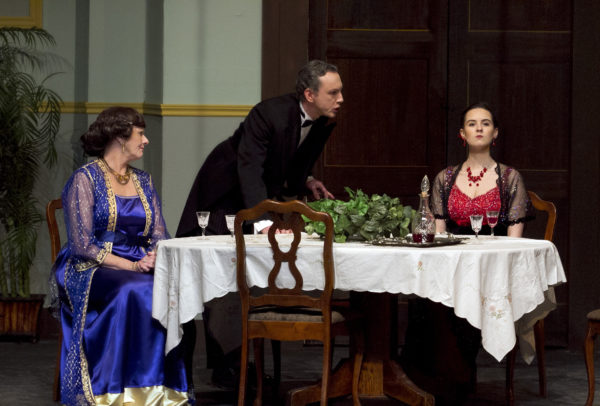An Inspector Calls: A classic thriller struggles to survive OLT’s treatment.

Photo: Maria Vartanova
Photo Maria Vartanova
An Inspector Calls By J.B. Priestley , directed by Jim McNabb
J.B. Priestley’s An Inspector Calls is such a well-crafted play that it can even survive the ill-conceived treatment meted out to it by Ottawa Little Theatre.
So even though OLT’s current production rarely meets the script’s full potential, there are still some effective moments as a mysterious police inspector named Goole descends on a well-to-do upper-middle-class household and proceeds to tear its complacencies asunder with his questions about the suicide of a young woman in this North Midlands town.
And there is no denying that the play’s climax, and the eerie conundrum it poses, can administer a satisfying jolt, even in a hit-and-miss offering like this one. At its best, An Inspector Calls displays its credentials as a classic 20th Century stage thriller by a master dramatist. But J.B. Priestley was also a dramatist with a conscience. It’s no accident that he sets this play in 1912, two years before the outbreak of war, a time when the smug certainties of Edwardian England were yielding to the first signs of fracture in the social order.
We’re plunged into an evening in which members of the Birling family are celebrating the engagement of one of their own — daughter Sheila — to the dapper Gerald Croft. For that patriarchal industrialist, Arthur Birling, it’s the most desirable of matches, given Gerald’s own moneyed background. So God’s in his heaven and all’s right with this world — until Inspector Goole comes calling.
But what on earth do the people at this engagement party have to do with a young woman who has died in agony at the local infirmary after swallowing disinfectant? A great deal, as it turns out, once the Inspector’s questions start turning over unpleasant stones in the lives of every person in the Birling parlour. And inevitably one burning question looms: did this young woman die because she was of the wrong class?
Yes, the play is polemic — written by a Socialist playwright in 1945, the year that Priestley was also heralding the advent of a new British Labor government determined to bring about social equality. But it’s also a work of dramatic power — or at least it should be.
Jim McNabb’s OLT production seems to distrust the quality of the script — its carefully orchestrated modulations, its probing characterizations, its sense of simmering unease. Instead he’s opted for what is largely a strident, one-note approach, devoid of shading and subtlety.
This is unfortunate because we’re repeatedly conscious of more nuanced performances ready to break through. Katherine Williams, as the newly engaged Katherine Birling, clearly conveys a sense of the moral crisis afflicting her character — a young woman of privilege whose moment of fury in a dress store has helped dispatch another young woman to her doom — but the production pushes her into an excessive shrillness that leaves her no place to go. And Roy Van Hooydonk’s Arthur Birling, initially a bluff, unthinking study in entitlement, ends up as so much of a caricature that it led to giggles the other night.
Only two performers managed to show a grasp of character — Guy Newsham, very good as Katherine’s fiancee, and Janet Rice as Mrs Birling, the quintessential monster matriarch whose cruelties towards a defenceless young woman also reveal someone who is herself a victim helplessly locked into her own certainties and prejudices about the proper order of things.
Nevertheless, a lack of nuance and dimension hobbles a production that too often lapses into a series of shouting matches. And the most puzzling contribution of the evening comes from John Collins, an actor known for his thoughtful and detailed characterizations. Collins also understands the value of understatement, a quality inexplicably lacking in his portrayal of Inspector Goole. Collins comes on like gangbusters in the role, seething hostility from his arrival. It’s all surface, an extended snarl of a performance, one which drains the inspector of his true unsettling life. Gone are a sense of enigma and the unexplained, the tinges of mystery and menace, an underlying righteousness which is all the more potent when it is not allowed to accelerate into fierce melodramatics. Inspector Goole is one of the most fascinating characters in the Priestley canon, but you wouldn’t know it from this performance.
An Inspector Calls continues at Ottawa little Theatre to January 27.
Director: Jim McNabb
Set: Paul Gardner
Lighting: Barry Sims
Sound: Bradford MacKinlay
Costumes: Peggy Laverty
Cast:
Arthur Birling………………………………..Roy Van Hoooydonk
Gerald Croft…………………………………Guy Newsham.
Sheila Birling………………………………..Katherine Williams
Sybil Birling…………………………………Janet Rice
Edna…………………………………………Angela Petty
Eric Birling………………………………….Jamie Hegland
Inspector Goole……………………………..John Collins